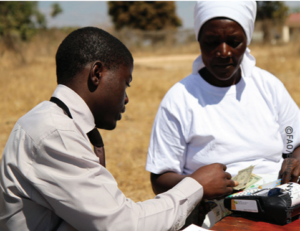LIVELIHOODS AND FOOD SECURITY PROGRAM (LFSP)
LIVELIHOODS AND FOOD SECURITY PROGRAM (LFSP)
Zimbabwe
(Implemented by FACHIG Trust and World Vision and Funded by DFID through FAO)
Contact persons: Maggie Makanza / Thomas Mupetesi
Email: maggiemakanza@yahoo.com /fachigtrustinfo@gmail.com/ thomasmupetesi@gmail.com
Website: www.fachig.co.zw
We are making a lot of money for our group through this popping machine. We sell our popcorn at nearby schools and tuck shops with the hope that bulk orders will be done from here. We cannot imagine as farmers in remote parts of the district doing such projects. This will really transform our lives and local communities
Peter Chinzara (53) of Mt Darwin district ward 5 Tsenga, Chinzara village,Takunda VSLA group
Challenge
LFSP is a project implemented in different provinces in Zimbabwe (including rural areas) that aims to reduce poverty among rural farming households. As part of its interventions, LFSP works specifically on Village Savings & Loans Associations (VSLA), and faces the challenge of ensuring that members of these groups trust each other in order to avoid conflict. Other additional challenge that households and families face is that their income depends mainly on one source: agriculture; this is why LFSP helps farmers to diversify their income with off-farming activities for low-harvest periods.
Solution and innovation
Creation of trust among VSLA group members
LFSP understands the importance that trust has among VSLA group members and this is why this program proposes different mechanisms that help creating transparency and accountability; increase their capacity and skills; development of confidence among group members to undertake major investments; and even formalization and registration as Savings and Credit Cooperative Societies (SACCOs).
Some of these mechanisms are: (i) self-selection of VSLA members; co-creation of group’s constitution (the constitution is the document that contains the governance structure, procedures, policies and rules of the group); (iii) clear and transparent record keeping; (iv) skills trainings part of the graduation process (see point below).
For more information about the creation of trust among VSLA members, please watch the following video prepared by DFID for the E-Motive exchange: https://oxfam.box.com/s/6400482573s98f7ebm24fiisvzoqkjz3

- Diversification of income through off-farming activities
LFSP has two strategies for diversifying farmers’ income. The first one is the graduation process that helps farmers internally raise own capital for both on and off-farm investments. It is a seven module process on VSLA methodology that touches upon important topics such as: skills in leadership, constitution making, setting up and operating VSLAs, savings and credit funds as well as use of monitoring and evaluation tools for reporting and learning. Additionally, the graduation process includes skills related to identification and operation of Income Generating Activities and other investments. This is supported by Value Chain Development (VCD) and financial action learning system (FALS) modules. The main innovation of the graduation process is the possibility of synchronizing it with the GALS process. Both processes use a stepped approach with cycles that can neatly fit into each other. Thus the results of GALS can easily feed into the graduation process, ensuring its success.
The second one is related to VCD. For this, the project uses different GALS tools to upgrade value chains (VCs) for the mutual benefit of small scale producers and other chain actors. The main thrust of DFID is to enhance skills of small scale producers to participate in VCs on an equal footing as the other bigger actors and stakeholders, identify potential products and business options; steps in the value chain in which farmers could get involved; possible challenges and solutions.
For more information on the Graduation Process, please watch the following video prepared by DFID for the E-Motive exchange: https://oxfam.box.com/s/gu3who3qpckmte3gbfjvth2bq1arwp4o
Results
The application of GALS in LFSP reached over 50 000 households in three districts. The participants are able to do their own household livelihood plans using the multi-lane highway (MLH) model. This has resulted in noted behaviour change on cultural norms and practices and improvements in livelihoods.
GALS was mainstreamed in a rural finance project of which LFSP facilitated the creation of 4000 village savings and loans associations (VSLAs) and 50 SACCOs (Savings and Credit Cooperatives). The VSLAs and SACCOs were instrumental in generating savings to the tune of USD 6,2m in 2017 and USD 4,6m in 2018 (FAO, 2019).
In addition, LFSP collaborated in the co-creation of a marketing model which involved input and output market development, contract farming and mechanization. This has strengthened the capacity of smallholder farmers to participate more effectively in value chains and off-farming activities. To this end, a total of 31 VSLAs have invested over US$180,000.00 in different enterprises including maize and groundnut shellers, maputi guns, hammer mills, oil pressing machines, tractors, egg incubators and dehallers. At household level participants have established both productive and non-productive investments including goat and poultry production, micro irrigation equipment, farm implements and traction and milk animals (cattle) and modern kitchens, 3-4 bedroomed houses, toilets etc. respectively.
